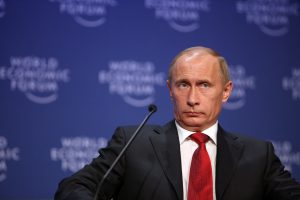These elections will be like no other. Against the backdrop of two wars on our borders and the United States distancing itself from us, the European elections next June will, for the first time, focus on immediate issues of common security.
They will be no mid-term elections. They will not even be about deciding between forces – socialists and centrists, conservatives and greens – whose opinions on the essential questions already converge, both in the European Parliament and in the Council. No, they will be about debating the three threats we are facing, deciding on the best ways for our Union to respond to them, and mandating the Parliament accordingly.
In the East, Vladimir Putin wants to bring Ukraine to its knees before it acquires combat aircrafts and before he has to issue a new order of military mobilisation that would undermine his authority. Once the thaw and the mud have passed, a Russian offensive is thus to be feared. This offensive could score important points and it will be at that moment, when the primaries are in full swing in the United States, when the election campaign opens in the Union and when he himself has been re-elected, that Vladimir Putin could propose a ceasefire.
This would be a way for him to secure a division of Ukraine before a prolongation of the war becomes highly uncertain for him. Donald Trump and the extreme right in Europe would call for this offer to be accepted. Western opinions would be divided and Vladimir Putin would surely come out on top. At the very least, he would be applauded by a significant part of the Western political playing fields, and if he succeeded in getting his proposal accepted, he would buy himself time to prepare new assaults, as he did after the annexation of Crimea.
If we do not want the Russian President to pursue his imperial aims and continue working to divide the democracies, it must be clear that our objective is to force him to admit defeat and recall his troops so that a democratic Russia can contribute to the strength and stability of our common continent in the future.
In the South, the situation is quite different. There, we do not have an adversary in front of us, but a growing chaos where the political assertiveness of the oil monarchies, the Iranian regime’s breathless quest for survival, Hamas’s determination to destroy the Jewish State by driving it out of its senses, and the blindness of an Israeli right-wing that believes it can avoid the creation of a Palestinian State by force, all combine. If we do not want this chaos to engulf us, we must no longer hesitate to put our trade agreements with the Israelis and our financial support for the Palestinians in the balance, in order to encourage them to negotiate the coexistence of two States.
Finally, in the West, the challenge is even greater. Whoever the next President is, the United States will continue to distance itself from Europe and if Donald Trump returns to the White House, he will dismantle the Atlantic Alliance and make deals with Vladimir Putin at the expense of the Ukrainians and our 27 States. He has started to do this by getting his friends in the House to block American aid to Ukraine, but once elected, he would recognise Russian sovereignty over the Donbass and Crimea in order to weaken us and weaken the ties between China and Russia.
Soon, or very soon, because the Americans’ problem is no longer Russia but China, and because Donald Trump sees us as rivals to be pushed aside, we may find ourselves alone in the face of Vladimir Putin and the chaos of the Middle East. We must not wait for that moment with our arms folded, but pool our resources to develop the pan-European arms industries that will enable us to ensure our strategic autonomy, stand shoulder to shoulder with Ukraine and perhaps, if there is still time, transform NATO into an alliance between two powers, the United States of America and the European Union.
We are under threat from all sides, but the greatest danger for us would be to believe that we are powerless and lost, when in fact we are not.
Neck and neck with China, we are the second largest economy in the world and could rapidly consolidate this position as Chinese growth slows down and the British will now seek closer ties with the Union through industrial, civil and military cooperations. Our currency is strong. We have all the resources we need to invest in our security, and at the same time everything is changing in the EU.
There is no longer any taboo on common defence. We are already ordering ammunition together and, over and above Mr Orban’s haggling, the Union remains unanimous in its support for Ukraine. It is equally unanimous on the Israeli-Palestinian question, since the Member States are all calling for the creation of a Palestinian state. With common positions on the two biggest crises of the moment, the Union is taking its first steps on the long road to building a political union, and it has just decided, unanimously still, to open accession negotiations with Ukraine.
This means that it will gradually be enlarged to include eight new countries, but beware! It cannot do so by simply hoping for an abolition of the right of veto, in spite of many of its members being committed to keeping it. We need to be much bolder and move towards a Union in which different degrees of integration coexist under the same flag.
This is already the case with the euro zone and the Schengen area, to which not all 27 countries wish to belong. We need to draw inspiration from what already exists to invent the Union of tomorrow, the Union of a century in which our political unity will ensure our influence and sovereignty.


